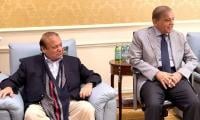country and outside, has never been questioned while the NAB has been quick to make references about the key political leaders’ assets.
The NAB avoided taking notice of The News investigative story about Musharraf’s successful but dubious journey from rags to riches. There has been no explanation offered by Musharraf but the retired general had accumulated billions in offshore accounts besides the property that he had already purchased in foreign lands or inside Pakistan.
The News in January 2012 had unearthed the details of Musharraf’s foreign bank accounts where he had deposited almost Rs2 billion. The story contained the account numbers as well as the amount deposited in each bank/account yet it could not attract the attention of the NAB.
The NAB, in its recent report, has informed the SC about several mega land scams but there is no mention of former dictator General (retd) Pervez Musharraf who had doled out over 10,000 kanals of military land meant for war veterans and families of martyred soldiers to frontmen of some of his political opponents, non-entitled armymen and dozens of civilian officials including his cook, barber, butler, gunmen and other members of his personal staff.
This huge chunk of military land in the Punjab and KP provinces was allotted to non-entitled civilians and soldiers by the GHQ following orders from the then army chief General Pervez Musharraf. Over two dozen staff members and officials attached with Musharraf during his stay in the Presidency were also allotted hundreds of kanals of military land.
In the case of allotment of 6,700 kanals of military land in Punjab to 47 civilian officials of the provincial government during Musharraf’s rule, a reference was made to the military authorities by the Shahbaz Sharif government to cancel the anomalous transfer. However, no decision has been taken as yet on the issue.
With regard to the land given to non-military personnel including frontmen of some politicians in Dera Ismail Khan during the Musharraf regime, it was admitted by the military spokesman during General Kayani’s tenure that the allotments had no legal sanction but despite this flagrant illegality committed by the military dictator and former president, corrective measures have not been taken.
In Punjab, 47 civilian officials (mostly belonging to the Revenue Department) were allotted 6,700 kanals of military land during Musharraf’s regime. Most of these officials were made OSDs by the Shahbaz Sharif government during his last term. The Punjab government also formally approached the military authorities to get the controversial allocations cancelled.
The Punjab government was of the view that the civilian beneficiaries have been rewarded for going beyond the call of duty in facilitating the entire process.
The Punjab government also believed that if at all some part of the military land was required to be allotted to civilian officials by the GHQ, it should have been done through the provincial government instead of making such allotments directly. Musharraf also gifted away thousands of kanals of military land in Punjab to dozens of people who had been serving him well during his long stay in the Presidency. On Musharraf’s orders, not only such land was allotted to his cook, barber, butler and gunmen, but to all members of his personal staff. A vast majority of armymen was not entitled to get this benefit but they were still favoured because the man who ruled Pakistan as his personal fiefdom and ruined every state institution desired so without any fear of being questioned or held accountable.
With regard to controversial allotments of military lands in DI Khan, the NAB in 2010-11 approached the GHQ for the cancellation of military land to civilian persons but there has been neither any response nor any action taken to revoke Musharraf’s orders. The allotment of military land during Musharraf’s tenure in 2004 to the civilians in DI Khan was an illegal act and against the terms and conditions set for the allotment of such lands. Thousands of kanals of military land was allotted, including 1,200 kanals to frontmen of two top leaders of a political party. Yet the NAB report did neither mention Musharraf nor the mega scam.
Similarly, no criminal actions were taken against a gang of well-connected players of the 2005 Stock Exchange scam which, according to the conclusions of an official committee, had swallowed $13 billion of ordinary shareholders and middlemen during Musharraf’s tenure. It is alleged some 80 beneficiaries, mostly close associates of Musharraf and his cronies, had multiplied their fortunes by manipulating the scam. However, they were neither probed nor arrested to get back from them the plundered billions.
In another case, the Musharraf-Aziz duo launched a countrywide project called the Clean Drinking Water Scheme with the promise that one clean drinking water plant would be installed in every union council across the country by December 2007. Initially, it was a Rs7.7 billion project but was later raised to Rs16 billion.
Similarly, the Rs3.6 billion Tawana Pakistan project, providing school nutrition package to girls in 29 districts of the country, went down the drain because of the involvement of a blue-eyed minister of Musharraf, but the NAB was never allowed to question the minister.
The Pakistan Steel Mills privatisation, which was abandoned by the government following the Supreme Court’s order, was a case of serious charge sheet against Musharraf and his close associates, who had almost sold this national asset to their close friends for peanuts. As per the Supreme Court’s judgment, the privatisation process was defrauded, but no action was taken against anyone.
In 2006, the NAB under Lt-Gen (retd) Shahid Aziz wanted to probe the sugar scam, involving some ministers of the Musharraf regime, but in this case, too, the Bureau was stopped from probing the matter.
Corruption worth hundreds of millions of rupees was detected in the money allocated for the reconstruction work and rehabilitation of the 2005 earthquake victims. Massive corruption in these funds was reported to the NAB and also detected by the NAB’s Frontier office, but in this case, too, the bureau was asked to stay away.
In 2002, a senior Foreign Office diplomat, stationed in Jakarta, reported to Islamabad of the alleged kickbacks received by the then-ambassador, a retired major general and close relative of Musharraf’s wife, in the sale of Pakistani mission’s property in Indonesia at throwaway prices. As a result, the diplomat, minister at the Jakarta mission, was called back, suspended and never restored till his retirement in 2007-08.
The Post Office Department which, too, was headed by a retired major general and a close associate of Musharraf for more than five years in violation of rules and regulations, caused a unique financial scam of ghost pensioners. Although, certain ordinary officials were suspended and inquired, the NAB did not hold any inquiry and avoided confronting the top-notch of the department.
A major Malaysian labour export scam surfaced in which workers were heavily charged and sent to the foreign country but against fictitious jobs. The unskilled workers were asked to pay Rs60,000; however, most of them were overcharged as high as Rs160,000 per person. Some cabinet ministers of the Musharraf regime were allegedly involved in this scam, but no bigwig was probed.
Untouchables of the oil mafia caused colossal financial losses to the national economy with the connivance of some top players of the Musharraf regime. The NAB under Musharraf was told of their manoeuvring of oil prices to the advantage of refineries and oil marketing companies but the Bureau was not allowed to cross the limits.
According to a NAB source, because of the policies of oil pricing, refinery margins, distribution margins and deregulating the oil imports, a staggering amount of $7-8 billion per year was handed over to the handpicked chief executives of selected multinational and the national companies in the oil and gas sector. These refineries and oil marketing companies, it was reported in the media, were allowed to import petroleum products where the prices were manipulated to their advantage.
Images showed chopper´s landing skids protruding from river beside Manhattan´s West Side Highway
Senator clarified that Khan receives list of proposed visitors and retains sole authority to approve or reject meetings
Police officials said mother of missing brothers had been called to record her statement
Currently, four accused including Niaz Badami have been arrested
Even railway stations could be considered as part of Defence of Pakistan, says Justice Mandokhail
MWM leader asserted that court orders were being ignored and judiciary held no value







